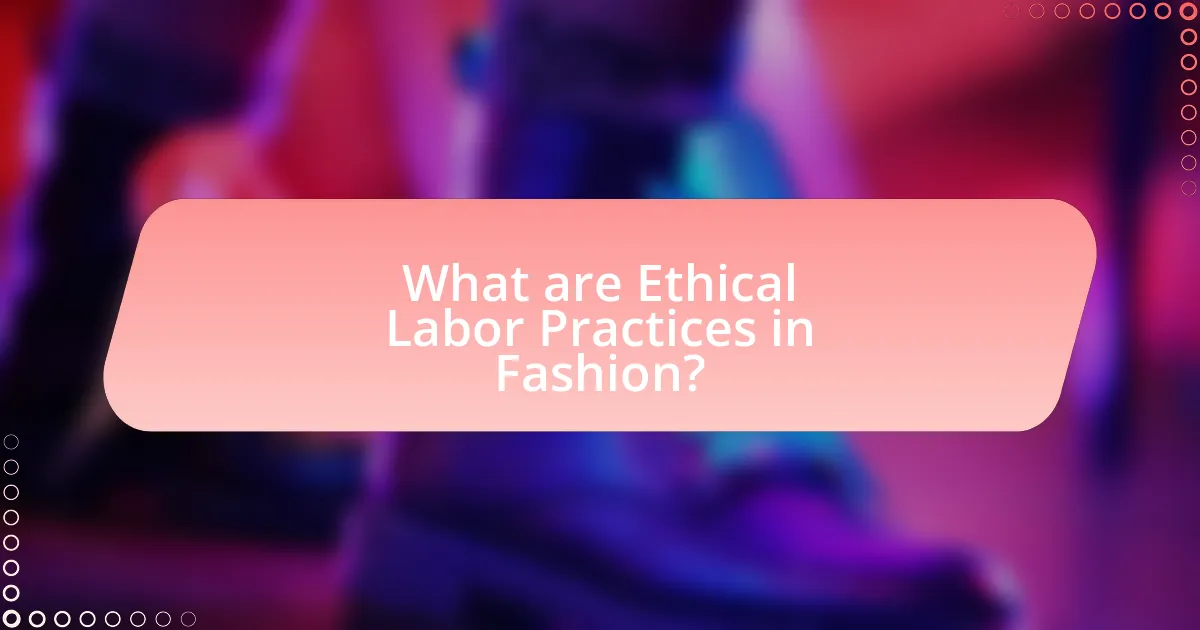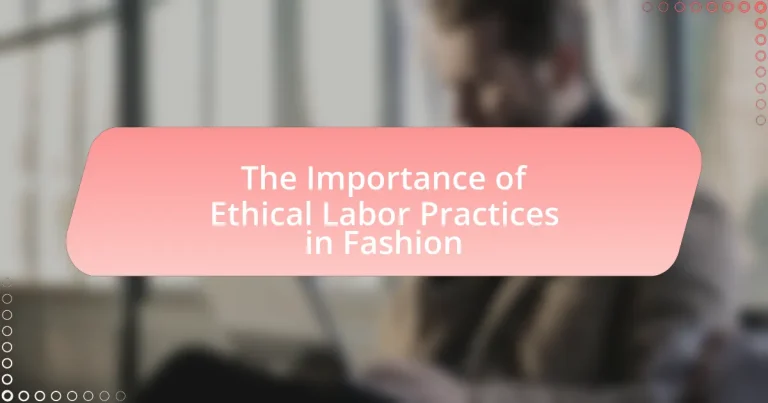Ethical labor practices in fashion encompass standards that ensure fair treatment, safe working conditions, and equitable compensation for workers. This article highlights the significance of these practices in combating exploitation, promoting social justice, and enhancing brand reputation. Key principles include fair wages, the right to organize, and the prohibition of child labor. The article also discusses the consequences of neglecting ethical standards, the challenges brands face in implementation, and innovative solutions to promote accountability. Additionally, it emphasizes the role of consumer advocacy and transparency in driving ethical practices within the fashion industry.

What are Ethical Labor Practices in Fashion?
Ethical labor practices in fashion refer to the standards and policies that ensure fair treatment, safe working conditions, and equitable compensation for workers in the fashion industry. These practices include paying a living wage, providing safe and healthy working environments, prohibiting child labor, and ensuring that workers have the right to organize and advocate for their rights. According to the International Labour Organization, approximately 25 million people are victims of forced labor in various industries, including fashion, highlighting the need for ethical standards. Implementing ethical labor practices not only protects workers but also enhances brand reputation and consumer trust, as evidenced by a 2021 survey indicating that 70% of consumers prefer to buy from brands that are committed to ethical practices.
Why are Ethical Labor Practices Important in the Fashion Industry?
Ethical labor practices are important in the fashion industry because they ensure fair treatment and safe working conditions for garment workers. These practices help to combat exploitation, reduce poverty, and promote social justice within the supply chain. For instance, according to the International Labour Organization, approximately 170 million children are engaged in child labor globally, many in the fashion sector, highlighting the urgent need for ethical standards. Furthermore, brands that adopt ethical labor practices often experience enhanced consumer trust and loyalty, as 66% of global consumers are willing to pay more for sustainable brands, according to a Nielsen report. This demonstrates that ethical labor practices not only benefit workers but also contribute to a brand’s long-term success and reputation.
What are the key principles of Ethical Labor Practices?
The key principles of Ethical Labor Practices include fair wages, safe working conditions, the right to organize, non-discrimination, and the prohibition of child and forced labor. Fair wages ensure that workers receive compensation that meets their basic needs and reflects their contributions, while safe working conditions protect employees from hazards and promote their well-being. The right to organize allows workers to form unions and advocate for their rights collectively. Non-discrimination mandates equal treatment regardless of race, gender, or other characteristics, fostering an inclusive workplace. Lastly, the prohibition of child and forced labor is essential to uphold human rights and ensure that all labor is voluntary and consensual. These principles are supported by international labor standards set by organizations such as the International Labour Organization (ILO), which emphasizes the importance of ethical practices in promoting social justice and sustainable development.
How do Ethical Labor Practices impact workers in the fashion industry?
Ethical labor practices significantly enhance the well-being of workers in the fashion industry by ensuring fair wages, safe working conditions, and respect for workers’ rights. When brands adopt ethical labor practices, they contribute to a more equitable work environment, which can lead to increased job satisfaction and productivity among workers. For instance, a study by the Ethical Trading Initiative found that companies implementing ethical labor standards reported lower turnover rates and higher employee morale, demonstrating the positive correlation between ethical practices and worker satisfaction. Furthermore, ethical labor practices can reduce the risk of exploitation and abuse, fostering a culture of respect and dignity in the workplace.
What are the consequences of ignoring Ethical Labor Practices?
Ignoring ethical labor practices leads to severe consequences, including legal repercussions, damage to brand reputation, and negative impacts on employee morale. Companies that fail to adhere to ethical standards may face lawsuits and fines, as evidenced by the Fashion Transparency Index, which highlights that brands with poor labor practices often encounter legal challenges. Additionally, consumers increasingly prefer brands that demonstrate social responsibility; thus, neglecting ethical labor can result in loss of customer trust and sales. Furthermore, low employee morale and high turnover rates are common in environments lacking ethical labor practices, as reported by the International Labour Organization, which states that ethical treatment of workers is crucial for maintaining a motivated workforce.
How does unethical labor affect brand reputation?
Unethical labor significantly damages brand reputation by eroding consumer trust and loyalty. When brands are linked to exploitative practices, such as child labor or unsafe working conditions, public backlash often ensues, leading to negative media coverage and social media outrage. For instance, a 2020 survey by the Ethical Consumer found that 50% of consumers would boycott a brand if it was found to be using unethical labor practices. This decline in consumer support can result in decreased sales and long-term financial losses for the brand. Additionally, brands may face legal repercussions and increased scrutiny from regulatory bodies, further tarnishing their public image.
What are the legal implications of poor labor practices in fashion?
Poor labor practices in fashion can lead to significant legal implications, including violations of labor laws, potential lawsuits, and financial penalties. For instance, brands that fail to comply with minimum wage laws or overtime regulations may face legal action from employees or regulatory bodies. Additionally, companies can be held liable for unsafe working conditions, which can result in lawsuits and fines under occupational safety regulations. The Fashion Transparency Index highlights that many brands are scrutinized for their labor practices, and failure to address these issues can damage reputations and lead to loss of consumer trust, further complicating legal standings.

How can Brands Implement Ethical Labor Practices?
Brands can implement ethical labor practices by establishing clear codes of conduct that prioritize fair wages, safe working conditions, and respect for workers’ rights. These codes should be enforced through regular audits and assessments of supply chain partners to ensure compliance. For instance, according to the Ethical Trading Initiative, companies that adopt such practices not only improve worker satisfaction but also enhance their brand reputation and customer loyalty. Furthermore, brands can engage in transparent reporting of their labor practices, which builds trust with consumers and stakeholders.
What steps can fashion brands take to ensure ethical labor practices?
Fashion brands can ensure ethical labor practices by implementing a comprehensive code of conduct that outlines fair labor standards, including fair wages, safe working conditions, and the prohibition of child labor. This code should be enforced through regular audits and assessments of suppliers to ensure compliance. For instance, brands like Patagonia and Everlane have established transparent supply chains and conduct regular third-party audits to verify adherence to ethical standards. Additionally, engaging with workers through surveys and feedback mechanisms can help brands understand and address labor issues directly. According to the Ethical Trading Initiative, brands that actively monitor and improve labor conditions not only enhance their reputation but also contribute to better worker satisfaction and productivity.
How can brands assess their supply chains for ethical compliance?
Brands can assess their supply chains for ethical compliance by conducting thorough audits and implementing transparent reporting mechanisms. These audits should evaluate labor practices, environmental impact, and adherence to local and international regulations. For instance, the Ethical Trading Initiative provides guidelines that help brands assess compliance through worker interviews, document reviews, and site inspections. Additionally, brands can utilize third-party certifications, such as Fair Trade or Global Organic Textile Standard, which offer verified standards for ethical practices. Research indicates that companies with robust supply chain assessments report higher levels of compliance and improved brand reputation, as seen in a 2020 study by the Fashion Transparency Index, which highlighted that 40% of brands improved their ethical practices through regular assessments.
What role do certifications play in promoting ethical labor practices?
Certifications play a crucial role in promoting ethical labor practices by establishing standards that companies must meet to demonstrate their commitment to fair treatment of workers. These certifications, such as Fair Trade, Global Organic Textile Standard (GOTS), and Ethical Trading Initiative (ETI), provide a framework for assessing labor conditions, ensuring compliance with labor laws, and promoting transparency in supply chains. For instance, GOTS requires that at least 70% of the textile content is organic and mandates fair labor practices, including safe working conditions and fair wages. This not only helps consumers make informed choices but also incentivizes companies to adopt ethical practices to gain certification, thereby fostering a culture of accountability and responsibility in the fashion industry.
How can consumers support Ethical Labor Practices in Fashion?
Consumers can support ethical labor practices in fashion by choosing to purchase from brands that prioritize fair wages and safe working conditions for their workers. Research indicates that brands like Patagonia and Everlane are committed to transparency in their supply chains, ensuring that workers are treated ethically. By actively seeking out and supporting these brands, consumers can drive demand for ethical practices in the industry. Additionally, consumers can advocate for change by participating in campaigns that promote labor rights, thereby influencing companies to adopt more ethical standards.
What should consumers look for when choosing ethical fashion brands?
Consumers should look for transparency in supply chains when choosing ethical fashion brands. This includes information about where and how garments are produced, ensuring that workers are treated fairly and paid a living wage. Brands that provide certifications from recognized organizations, such as Fair Trade or Global Organic Textile Standard, demonstrate a commitment to ethical labor practices. Additionally, consumers should consider brands that prioritize sustainable materials and environmentally friendly production methods, as these factors contribute to the overall ethical stance of the brand. Research indicates that ethical fashion brands often report higher levels of worker satisfaction and lower turnover rates, reinforcing the importance of ethical labor practices in the fashion industry.
How can consumer advocacy influence brands to adopt ethical practices?
Consumer advocacy can significantly influence brands to adopt ethical practices by creating pressure through public awareness and demand for accountability. When consumers actively voice their concerns about unethical labor practices, brands often respond by implementing changes to align with consumer expectations. For instance, campaigns led by organizations like Fashion Revolution have successfully prompted major fashion brands to disclose their supply chains, demonstrating that consumer activism can lead to increased transparency and ethical labor standards. Additionally, studies show that brands perceived as ethical can experience a boost in sales, reinforcing the idea that consumer advocacy not only drives change but also benefits businesses economically.

What are the Challenges in Maintaining Ethical Labor Practices?
Maintaining ethical labor practices faces significant challenges, including supply chain complexity, lack of transparency, and varying labor standards across countries. Supply chain complexity arises from the involvement of multiple tiers of suppliers, making it difficult for companies to monitor labor conditions effectively. Lack of transparency often results from insufficient data sharing among stakeholders, hindering the ability to assess compliance with ethical standards. Additionally, varying labor standards across different regions can lead to inconsistent practices, as companies may struggle to enforce their ethical policies in countries with weaker regulations. According to a report by the Ethical Trading Initiative, 60% of companies find it challenging to ensure compliance with labor standards due to these factors, highlighting the systemic issues that complicate the maintenance of ethical labor practices in the fashion industry.
What obstacles do brands face in implementing ethical labor practices?
Brands face significant obstacles in implementing ethical labor practices, primarily due to cost implications and supply chain complexities. The financial burden of ensuring fair wages, safe working conditions, and compliance with labor laws can deter brands from adopting these practices, especially in highly competitive markets where profit margins are slim. Additionally, the global nature of supply chains complicates oversight, as brands often rely on third-party manufacturers in countries with varying labor standards and regulations. According to a report by the Ethical Trading Initiative, 60% of brands struggle to monitor labor conditions effectively across their supply chains, highlighting the challenges in maintaining ethical standards consistently.
How do cost pressures affect ethical labor practices in fashion?
Cost pressures significantly undermine ethical labor practices in fashion by incentivizing brands to prioritize low production costs over fair wages and safe working conditions. As companies face increasing competition and demand for lower prices, they often resort to outsourcing production to countries with lax labor regulations, where workers may be subjected to exploitation, long hours, and inadequate pay. For instance, a report by the International Labour Organization indicates that garment workers in developing countries frequently earn less than the minimum wage, highlighting the direct correlation between cost-cutting measures and compromised labor standards. This trend not only perpetuates a cycle of poverty among workers but also raises ethical concerns regarding the responsibility of fashion brands to uphold humane working conditions.
What are the challenges in monitoring compliance across global supply chains?
Monitoring compliance across global supply chains presents significant challenges due to the complexity and diversity of regulations, cultural differences, and varying enforcement mechanisms. Companies often struggle to ensure that suppliers adhere to ethical labor practices, as local laws may differ widely from international standards. For instance, a 2020 report by the International Labour Organization highlighted that 25 million people are victims of forced labor globally, indicating a systemic issue in compliance monitoring. Additionally, the lack of transparency in supply chains makes it difficult to trace the origins of materials and labor practices, further complicating compliance efforts. These factors collectively hinder effective oversight and accountability in maintaining ethical labor standards within the fashion industry.
How can the fashion industry overcome these challenges?
The fashion industry can overcome challenges related to ethical labor practices by implementing transparent supply chains and adhering to fair labor standards. By adopting technologies such as blockchain, companies can track the origin of materials and ensure compliance with labor laws, thereby increasing accountability. For instance, a study by the Ethical Trading Initiative found that brands with transparent supply chains are more likely to improve working conditions and reduce exploitation. Additionally, engaging in partnerships with NGOs and labor rights organizations can provide guidance and resources to foster ethical practices.
What innovative solutions are being developed to promote ethical labor practices?
Innovative solutions being developed to promote ethical labor practices include blockchain technology for supply chain transparency, fair trade certifications, and the use of artificial intelligence to monitor labor conditions. Blockchain technology enables real-time tracking of products from source to consumer, ensuring that labor practices are ethical and compliant with regulations. Fair trade certifications provide a framework for companies to ensure that workers receive fair wages and safe working conditions, which has been shown to improve the livelihoods of workers in developing countries. Additionally, artificial intelligence tools analyze data from factories to identify potential labor violations, allowing for timely interventions. These solutions collectively enhance accountability and promote ethical labor practices in the fashion industry.
How can collaboration among stakeholders enhance ethical labor practices?
Collaboration among stakeholders can enhance ethical labor practices by fostering transparency, accountability, and shared responsibility within the fashion industry. When brands, suppliers, workers, and consumers work together, they can establish clear standards and expectations for labor practices, leading to improved working conditions and fair wages. For instance, initiatives like the Ethical Trading Initiative have shown that multi-stakeholder collaboration can lead to better compliance with labor standards, as companies are held accountable by both their peers and consumers. This collective effort not only promotes ethical practices but also builds trust and encourages a culture of continuous improvement in labor conditions across the industry.
What are some best practices for ensuring Ethical Labor Practices in Fashion?
To ensure ethical labor practices in fashion, companies should implement transparent supply chain management. This involves conducting regular audits of suppliers to verify compliance with labor standards, such as fair wages, safe working conditions, and the prohibition of child labor. According to the Ethical Trading Initiative, brands that engage in transparent practices are more likely to foster accountability and improve labor conditions. Additionally, establishing long-term relationships with suppliers can promote better working conditions, as it encourages investment in workforce welfare. Furthermore, brands should provide training programs for workers to empower them and ensure they understand their rights, which has been shown to enhance workplace safety and satisfaction.
What role does transparency play in ethical labor practices?
Transparency is crucial in ethical labor practices as it fosters accountability and trust between employers and employees. By openly sharing information about labor conditions, wages, and sourcing practices, companies can ensure that their operations align with ethical standards. For instance, a 2020 report by the Ethical Trading Initiative found that brands demonstrating transparency in their supply chains were more likely to be held accountable for labor rights violations, leading to improved working conditions. This correlation highlights that transparency not only enhances corporate responsibility but also empowers workers by providing them with the information necessary to advocate for their rights.
How can brands effectively communicate their ethical commitments to consumers?
Brands can effectively communicate their ethical commitments to consumers by utilizing transparent messaging and engaging storytelling. Transparency involves sharing detailed information about sourcing, labor practices, and sustainability efforts, which builds trust. For instance, brands like Patagonia openly disclose their supply chain practices and environmental impact, reinforcing their commitment to ethical standards. Engaging storytelling can be achieved through campaigns that highlight real stories of workers and communities impacted by their practices, making the ethical commitment relatable and tangible. Research indicates that 66% of consumers are willing to pay more for sustainable brands, demonstrating the effectiveness of clear communication in influencing purchasing decisions.


